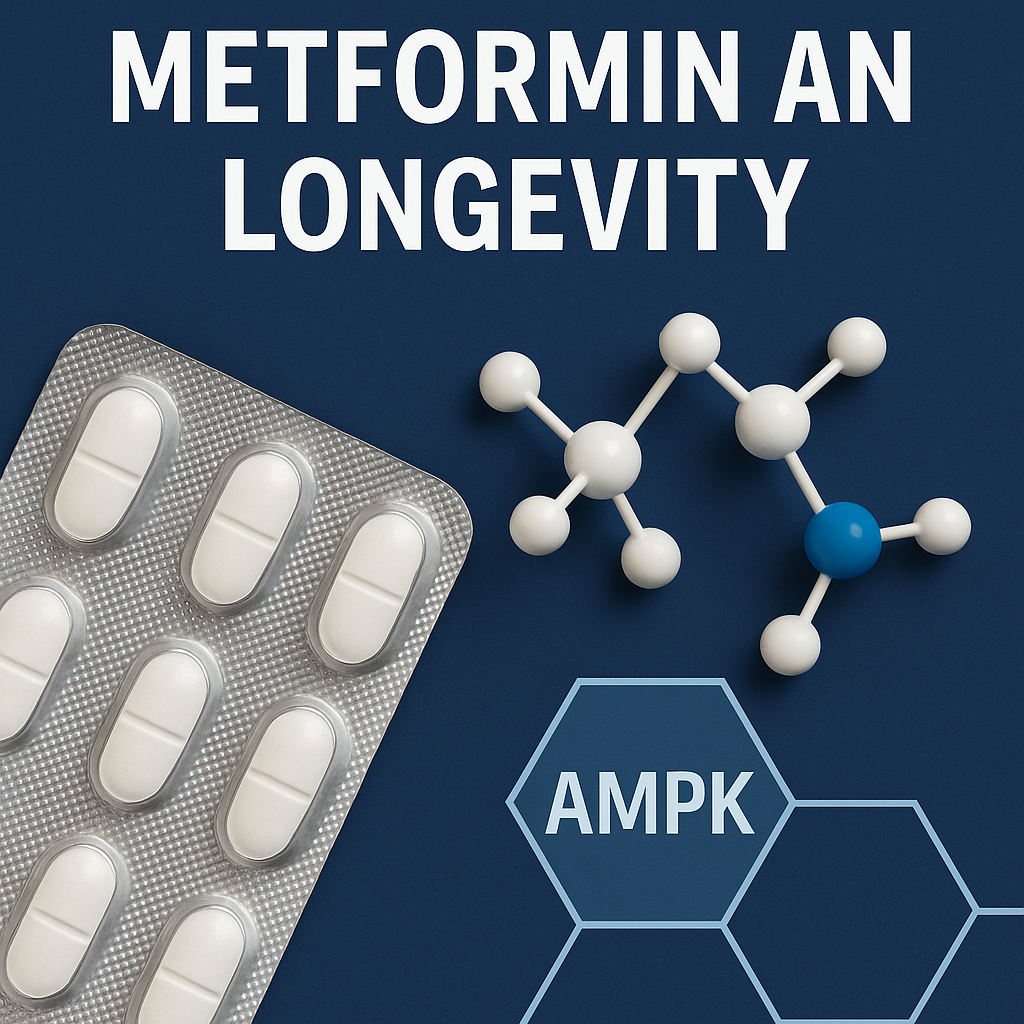Metformin & Longevity: Signals, Caveats, and Smart Use

Metformin’s reputation as a potential longevity drug rests on decades of diabetes data plus fresh mechanistic and clinical clues. The headline: there’s promising evidence for healthspan (lower disease risk, better metabolic tone), mixed evidence for lifespan, and clear caveats—especially if you’re healthy, training hard, or not monitoring B12.
What It Is (and Why Longevity Folks Care)
First-line therapy for type 2 diabetes, metformin lowers hepatic glucose output and improves insulin sensitivity. Mechanistically, it inhibits complex I at low dose, activates AMPK, suppresses mTOR, and nudges cells toward autophagy and lower inflammatory signaling—classic hallmarks-of-aging levers.
What the Evidence Says (2025 Snapshot)
- Observational “win” in diabetics: Multiple cohorts suggest diabetics on metformin sometimes live as long or longer than non-diabetics—remarkable, but confounded. Use this as hypothesis-generating, not proof for healthy users.
- Mixed/uncertain in non-diabetics: Reviews now stress controversy around true lifespan extension; benefits may depend on who takes it and when.
- Exercise interaction: In older adults, metformin blunted gains from resistance and endurance training (strength, hypertrophy, VO₂). If training adaptations are a priority, timing or avoidance may be wise.
- Microbiome & systems effects: Long-term use alters metabolome and can shift gut ecology, with heterogeneous results across populations.
- TAME trial (status): A multi-site, ~3,000-participant trial aims to test whether metformin delays multi-disease onset in older adults—critical for settling the question.
Potential Longevity Benefits (Most Plausible)
- Metabolic resilience: Lower fasting glucose/insulin; improved cardiometabolic risk factors.
- Inflammation & cellular stress: AMPK/mTOR/autophagy shifts may reduce inflammaging.
- Disease delay vs. “aging per se”: The best-case near-term win is later onset of common age-related diseases rather than outright age reversal. TAME is designed around this composite outcome.
Who Might Consider It (and Who Shouldn’t)
- Possibly appropriate: Older adults with prediabetes/metabolic syndrome, high cardiometabolic risk, or limited exercise capacity; those enrolling in clinical trials. Discuss with a clinician.
- Use caution/avoid:
- Hard-training older adults seeking muscle/fitness gains (metformin may blunt adaptations).
- B12 risk: Long-term use increases vitamin B12 deficiency risk; monitor and supplement as needed.
- Standard contraindications (e.g., significant renal impairment) still apply via prescribing guidance (not covered here).
Dosing Patterns Seen in Studies (Not Medical Advice)
- Typical clinical doses: 500–2,000 mg/day (often ER), titrated to tolerance. Longevity protocols in non-diabetics are not established; any off-label use should be clinician-directed with labs (A1c, eGFR, B12).
- Training workaround idea (emerging): If used, some propose avoiding metformin on key training days to preserve adaptations; this has not been validated in trials—flag as experimental.
Bottom Line
Metformin is cheap, safe (when monitored), and mechanistically plausible for healthy aging—but it’s not a blanket longevity pill. It looks most useful for people with metabolic risk, less so for athletic, insulin-sensitive adults prioritizing muscle and fitness. Watch TAME and related studies for decisive answers.
Sources
- Soukas AA et al. Front Endocrinol 2019 — Critical review: benefits vs. controversy on lifespan.
- Zhang T et al. Molecules 2025 — Mechanisms: AMPK/mTOR, autophagy, epigenetics.
- Umekar M et al. Biomed Pharmacother 2025 — Molecular anti-aging mechanisms overview.
- Bannister CA et al. Diabetes Obes Metab 2014 — Metformin users’ survival vs non-diabetics.
- Campbell JM et al. Ageing Res Rev 2017 — Meta-analysis: lower all-cause mortality with metformin in diabetics.
- Walton RG et al. Aging Cell 2019 — Metformin blunted resistance-training hypertrophy in older adults.
- Witham MD et al. Lancet Healthy Longev 2025 — Exercise + metformin effects on strength/endurance.
- AFAR — TAME trial overview (multi-disease delay endpoint).
- Abou Zaki R et al. Signal Transduct Target Ther 2024 — Metformin and aging clocks (review).
- Atkinson M et al. Nutrients 2024; Alvarez M 2025 review — B12 deficiency risk & screening guidance.
- Zhou R et al. 2025; Glaros SB 2025 — Long-term metformin, microbiome/metabolome changes.



